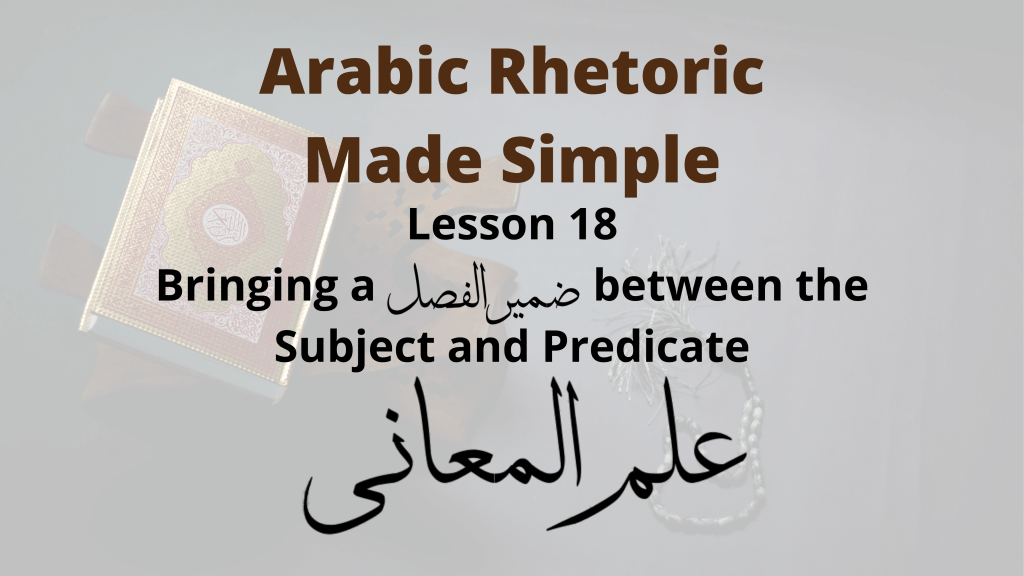In this lesson on ilm ul-Balagha we are going to talk about why you would bring a “Pronoun of Separation” (ضمير الفصل) between the subject and the predicate of a sentence.

The Pronoun of Separation ضمير الفصل /dhamir al-fasl/ in Arabic is a pronoun that comes between the subject and predicate, and matches the subject in gender, voice and plurality.
Its purpose is to clearly divide the sentence between subject and predicate. This is useful if both the subject and predicate are definite.
Take for example:

This can be interpreted as a full sentence which means “Zaid is standing”.
But because both parts of the sentence are definite, this is more likely to be understood as meaning “Zaid, the one who is standing”, and then the predicate is missing.
Both interpretations are possible, with the latter actually being more likely.
1. Separates Subject and Predicate
In order to make sure this sentence is interpreted as a sentence, we bring a separating pronoun (ضمير الفصل), and it becomes:

But we already know that from grammar.
So, from a balagha perspective, ضمير الفصل has another benefit.
2. Restrict Predicate to Subject
What a ضمير الفصل does from a balagha perspective is that it insinuates that the predicate is restricted to the subject.
When we say زيد هو القائم (Zaid is the one standing), we are implying that no one else is standing but Zaid. This is clear from the English translation: “Zaid is the one standing”, or “Zaid is the very person who is standing”, etc.
This is useful when for example someone says: “Congratulations. Amr wins the award for standing”. Then you would say: “No, wait. Zaid is the one standing”.
Examples from the Qur’an
Let’s take an example from the Qur’an. Allah says:

These are two examples of ضمير الفصل.
This is a conversation of Prophet Eesa (peace be upon him) and Allah.
Allah asked Eesa (peace be upon him): “Was it you that commanded the people to worship you and your mother?”.
In response to this question, Eesa (peace be upon him) first says: “SubhanAllah, I do not have the audacity to say what I don’t have the right to say. If I said that to the people, then You would know it. I don’t know what is in Your knowledge, but You know what I am thinking. It is You who is the Allam-ul guyoob, not me or anyone else”.
This is the first occurrence of the ضمير الفصل: “It is You who knows the unseen”.
The next thing Eesa (peace be upon him) says is: “I only told them what You commanded me to tell them, and You were watching them the entire time I was with them. And then when you took me up to the heavens and when I left them, You were the very One who watched over them”. This is the second occurrence of ضمير الفصل.
- Proceed to next lesson: Hastening the Subject (تقديم)
- Return to index page: Intro to Ilm Ul-Ma’ani
- Start free lessons: Sign Up for Free Mini-class